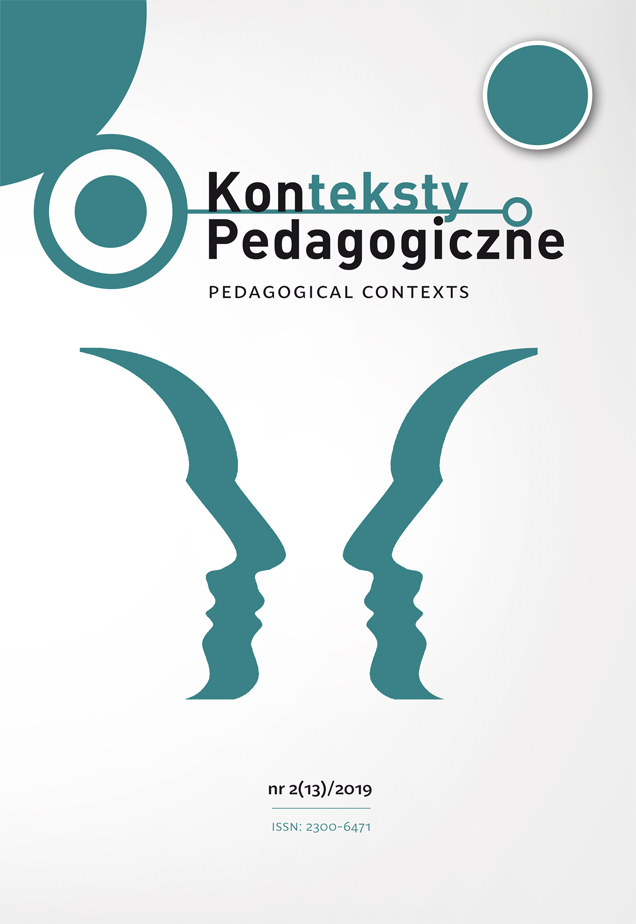Abstract
The vision of school based on constructivist education, in which the students are active participants and where the child’s knowledge is developed in the course of interaction with the environment, has long been the goal of many educational experts. Unfortunately, it remains just a theoretical construct for most of them, not applicable in a real school. Similarly, many teachers and principals, though they agree with the assumptions of constructivist education, do not see the possibility of implementing it at school and ask directly: What would it look like? What is the essence of it? What should it be based on? These doubts formed the basis for the development of a research project titled “Mutual Learning Education – Constructivism in School Practice,” whose main objective was to transform the instructional teaching paradigm applied by teachers into a constructivist educational model. This article presents the results of part of the research conducted within the framework of the above-mentioned project devoted to changing the instructional educational methods applied by teachers into constructivist methods intended to strengthen students’ skills connected with responsibility and involvement in the development of their knowledge.
References
Bałachowicz, J., Halvorsen, V.K. and Witkowska-Tomaszewska, A. (2015). Edukacja środowiskowa w kształceniu nauczycieli [Environmental Education in Teacher Training]. Warszawa: Akademia Pedagogiki Specjalnej.
Czerepaniak-Walczak, M. (2014). Badanie w działaniu w kształceniu i doskonaleniu [Action Research in Education and Training]. Przegląd Badań Edukacyjnych, 19, 181–194.
Elliott, J. and Adelman, C. (1974). Ford Teaching Project Reports and Documents, Care. Norwich: University of East Anglia.
Elliott, J. and MacDonald, B. (eds.) (1975). People in Classrooms. Norwich: University of East Anglia.
Elliot, J. (2010). Używając badań do ulepszenia praktyki: koncepcja praktyki opartej na danych empirycznych [Using research to improve practice: the notion of evidence-based practice], transl. K. Liszka. In: H. Červinková and B. Gołębniak (eds.), Badania w działaniu. Pedagogika i antropologia zaangażowane [Action Research. Involved Studies on Education and Anthropology] (pp. 155–182). Wrocław: Wydawnictwo Naukowe Dolnośląskiej Szkoły Wyższej.
Eurydice European Office. (2002). Kompetencje kluczowe. Realizacja koncepcji na poziomie szkolnictwa obowiązkowego [Key competencies. A developing concept in general compulsory education]. Brussels: Eurydice European Office.
Hustler, D., Cassidy, T. and Cuff, T. (1986). Action Research in Classroom and Schools. Boston: Allen and Unwin.
Kemmis, S. and McTaggart, R. (1988). The Action Research Planner. Geelong: Deakin University Press.
Klus-Stańska, D. and Szczepska-Pustkowska, M. (2009). Pedagogika wczesnoszkolna – dyskursy, problemy, rozwiązania [Early Childhood Education – Discourses, Problems, Solutions]. Warszawa: Wydawnictwa Akademickie i Profesjonalne.
The Royal Ministry of Education, R. a. (1997). Core Curriculum for Primary, Secondary and Adult Education in Norway, p. 5: Norwegian Board of Education, www.udir.no/ kl06/NAT1-03 [accessed: 18.10.2019].
Tuwim, J. (2010). Wiersze dla dzieci [Poems for Children]. Warszawa: Prószyński Media.
Witkowska-Tomaszewska, A. (2015). Konstuktywistyczna wizja edukacji [Constructivist Vision of Education]. In: J. Bałachowicz, K.V. Halvorsen and A. Witkowska- Tomaszewska (eds.), Edukacja środowiskowa w kształceniu nauczycieli: perspektywa teoretyczna [Environmental Education in Teacher Training. A Theoretical Perspective] (pp. 63–94). Warszawa: Wydawnictwo Akademii Pedagogiki Specjalnej.
In accordance with the recommendation of the Ministry of Science and Higher Education, which aims to counteract the practice of “ghostwriting” and “guest authorship,” all authors submitting their text for publication should attach an author’s statement which declares the contribution of each of the authors to the article. The printed and signed statement should be delivered by mail or other means to editor-in-chief Joanna Skibska or sent in the form of a scan to the following e-mail address: redakcja@kontekstypedagogczne.pl. The authors will not receive remuneration for publishing their papers. The editors reserve the right to make minor editorial changes to the articles which will not affect the substance of the article. We encourage all authors to prepare their articles in accordance with the guidelines for manuscript preparation. Download pdf file.
Authors transfer all copyrights and grant the journal the right of first publication with the work simultaneously licensed under a Creative Commons Attribution License that allows others to share the work with acknowledgement of the work's authorship and initial publication in this journal. All authors agree to the publishing of their email addresses, affiliations and short bio statements with their articles during the submission process.

